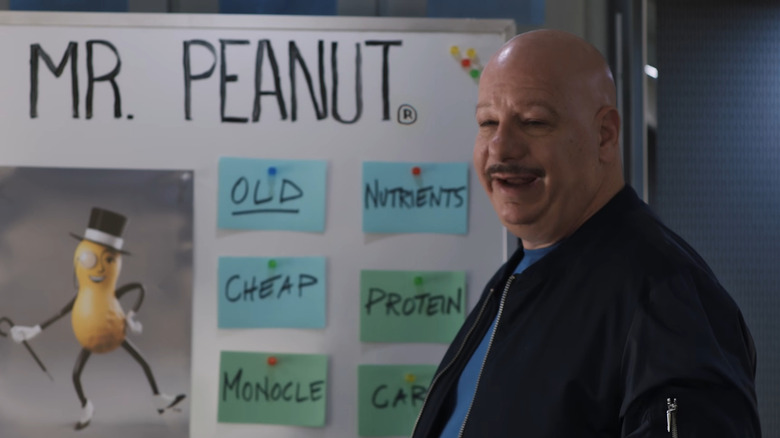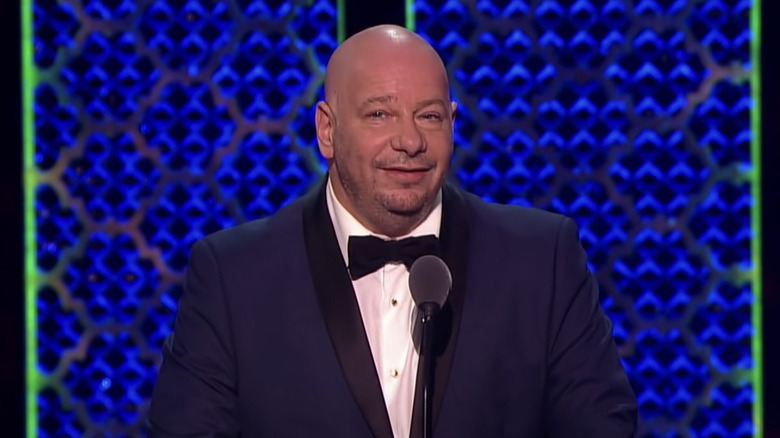Why You Recognize The Comedian In Planters' Super Bowl 2023 Commercial
Two familiar faces are making their way back to television for Super Bowl LVII. One is the famous Planters Peanuts mascot, Mr. Peanut.
You may recall, Mr. Peanut had been a little reckless of late. In a 2019 Super Bowl ad (marked one of the worst commercials from Super Bowl LIII), he was driving his "Nutmobile" rather carelessly as he delivered a can of Planters mixed nuts to ballplayer Alex Rodriguez, zipping past Charlie Sheen seated on a park bench. "And people think I'm nuts," Sheen said. Then, in a rather bizarre turn in 2020, Mr. Peanut was on a road trip with Matt Walsh and Wesley Snipes — singing Cutting Crew's 1986 hit "I Just Died in Your Arms Tonight" — when he lost control of the "Nutmobile." The vehicle careened off a cliff, and as the three hung desperately from a tree branch, Mr. Peanut made the ultimate sacrifice: letting go and falling to his death to save his friends.
But fear not. Later that same Super Bowl, a new Baby Nut was born during Mr. Peanut's funeral. And now the adult Mr. Peanut is back for a new 2023 Super Bowl ad, per Variety. What's more, the snack company has decided to welcome back their mascot by having him roasted, just like the official events frequently held to skewer different celebrities on Comedy Central. (Get it? Roasted nuts?) And who better to host the roast of Mr. Peanut than a comedian who roasts others for a living?
Jeff Ross is the official Comedy Central Roastmaster General
Joining Mr. Peanut on his return to the Super Bowl is standup comedian Jeff Ross. Ross is also an actor, writer, director, and producer who has appeared in different projects like "The Wedding Ringer," "The Emoji Movie," "Dr. Ken," and "American Dad!" But he's mostly known for playing himself on shows like "The Simpsons" and "Crank Yankers," and especially as the Roastmaster General for the Comedy Central Celebrity Roasts.
Ross's first onscreen roast appearance was on "The N.Y. Friars Club Roast of Drew Carey," according to Rolling Stone, which was televised by Comedy Central in 1998. The roasts themselves were a Friars Club tradition dating back to the 1950s, where comedians would come together and say horrible yet (presumably) funny digs in "honor" of a celebrity. Comedy Central aired several of these Friars Club roasts, starting with Carey's, before creating its own series of roasts in 2003. Ross is a staple at nearly all of the televised roasts over the years. It's become his brand, branching out into series such as "Jeff Ross Presents Roast Battle" from 2016 to 2018, and Netflix's "Historical Roasts," where Ross and comedians take potshots at historical figures while honoring their legacies. Ross even uses the format for social commentary, per his website, taking on subjects like criminals, cops, and the Mexican border. So, while Mr. Peanut does try to help Ross prepare for his roast, the comedian already has plenty of experience.
Jeff Ross is the reason the roasts are televised
Though Jeff Ross is known as the Roastmaster General, he almost never serves as the actual roastmaster — that is, the host — for the Comedy Central Roasts. That position usually falls to someone more familiar with the honoree. So when Rob Reiner was subjected to the Friars Club Roast in 2000, his "This is Spinal Tap" star Michael McKean served as Roastmaster, and "Full House" costar John Stamos hosted Bob Saget's moment on the hot seat. But Ross almost always took a turn on the mic.
More importantly, Ross is a producer of the roasts, and pretty much the reason they are on television. Ross was invited to his first Friars Club roast at the 1995 takedown of Steven Seagal, which was hosted by Milton Berle. Once offstage, Berle gifted him some advice. "What he said was, 'You did good, but just remember kid, they only remember the home runs,'" Ross said on Dr. Drew After Dark, explaining the important lesson in honing his material. "[From that point] I was like, 'How do I get these roasts on TV?' That was my mission."
Ross did a few more roasts for fun, getting heavily into "alt-comedy" in New York and Beverly Hills, and then set about trying to get the show televised. "It was like an awakening of sorts, and I realized that this tradition was something that people should see," he said. "Not just fancy people who were members of this club."


